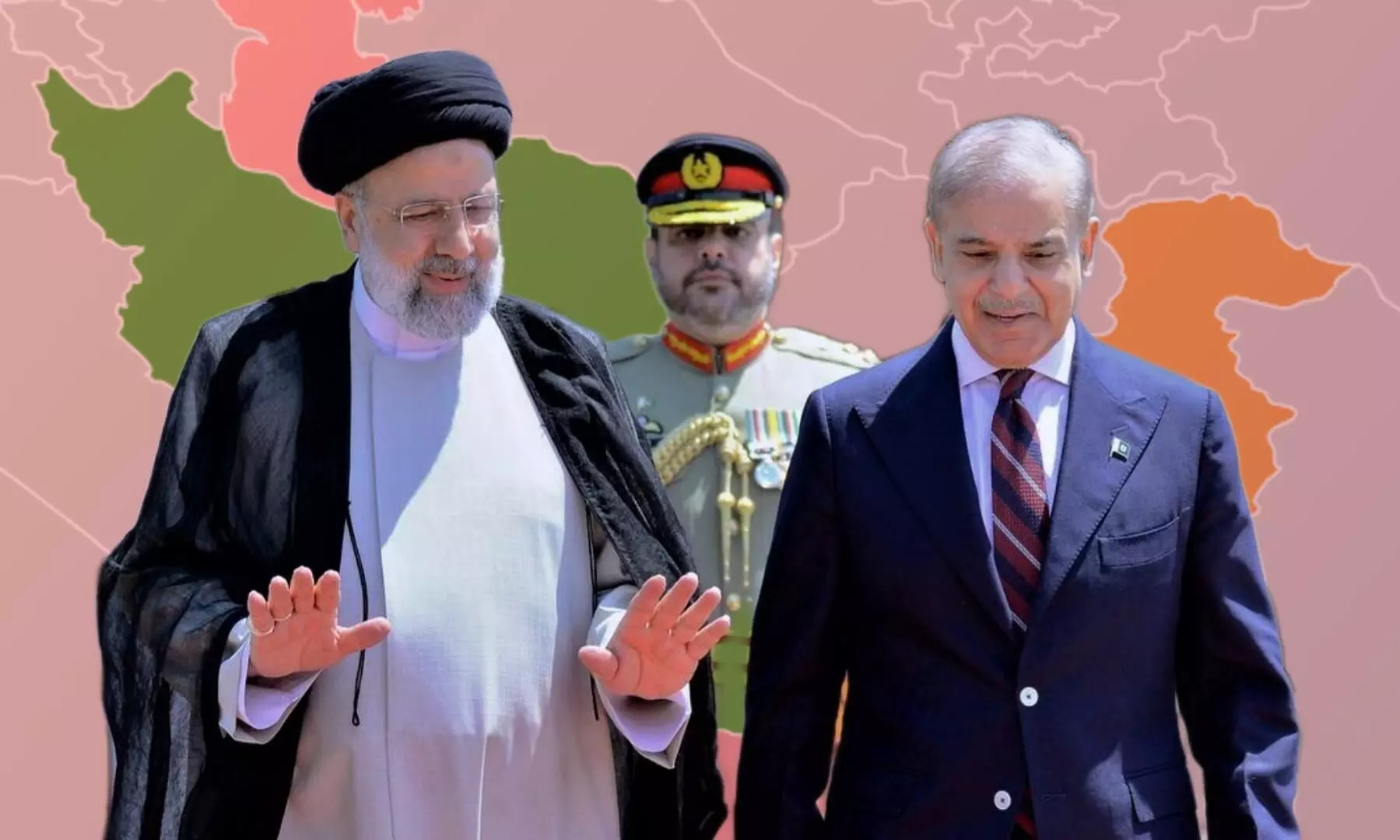Propitious diplomacy
Iranian President's diplomatic efforts aim to bolster ties amidst regional tensions, highlighting the significance of economic and security cooperation between Tehran and Islamabad

Iranian President Seyyed Ebrahim Raisi was in Pakistan very recently on a three-day trip to discuss regional and bilateral relations in the wake of Iran and Israel's military onslaught against each other, risking the Gaza war with a propensity to expand into a regional conflict. Raisi held talks with top Pakistani leadership, including Prime Minister Shehbaz Sharif, as the two neighbours now seek to mend ties after retaliatory missile attacks early this year.
Raisi arrived in Islamabad, on April 22 as the two neighbours also aimed to boost economic, border and energy ties. In a joint statement issued on April 21, Pakistan’s Ministry of Foreign Affairs called for improving bilateral ties. The two sides will now have a wide-ranging agenda to further strengthen Pakistan-Iran ties and enhance cooperation in diverse fields including trade, connectivity, energy, agriculture, and people-to-people contacts. The Iranian president also visited major cities, including Lahore and Karachi, and focusing on bilateral and trade ties.
Reacting to Raisi’s visit, Mosharraf Zaidi, a partner at advisory services firm Tabadlab, and former adviser to the Foreign Ministry, disclosed to Al Jazeera that Raisi’s trip was an effort to secure an expression of support from Islamabad including from the Pakistani military for Iran – as it stumbles deeper into a dangerous conflict with Israel. Zaidi added that Iran’s strategic thinkers were well aware that Pakistan has both a domestic political crisis and a growing range of economic pitfalls that restrict the range of movement on Pakistan’s engagement in the ongoing conflict in the Middle East. It may be further recalled that Iran and Pakistan have a history of an uneasy relationship, with both sides accusing each other of failing to control their militants operating with belligerence.
It is also pertinent to recall that the border tensions between Pakistan and Iran had escalated in January this year when Iran carried out air attacks across the border in Pakistan killing two children. Iran had said the attack was targeting two bases of the armed group Jaish al-Adl. Pakistan retaliated by firing a missile into Iranian territory which even led to the recall of Pakistan’s Ambassador in Tehran. Yet, the two neighbours decided to de-escalate tensions, with Tehran rushing its top diplomat to Islamabad to mend ties. The two countries then agreed to confront the “menace of terrorism” together, especially in the border region. Preceding Raisi’s visit, Tehran and Islamabad also talked about combating “terrorism”.
In light of these fresh developments, foreign policy analysts in Pakistan have backed re-engagement with Iran notwithstanding the prevailing border tensions. Pakistan has troubled borders with India as well as with Afghanistan. Therefore, according to veteran Pakistani diplomat Maleeha Lodhi, to have a normal, stable relationship with Iran has been of utmost importance for Pakistan, and it remains so.
Meanwhile, an editorial in Pakistan daily 'Dawn', described the visit by Iranian President Raisi, as marked by mutual praise, and promises to improve ties, particularly in the economic sphere. The significance of the trip has been enhanced by the prevailing geopolitical tensions in the region, particularly Iran’s conflict with Israel, poor ties between Tehran and the Western states, especially over the former’s central role in the ‘axis of resistance’, as well as the unpleasant flare up in January when Iran and Pakistan engaged in military strikes.
According to 'Dawn', trade dominated the Iranian President’s agenda, while security issues were also touched upon. On his part, Raisi said the current level of bilateral trade was “unacceptable”, and desired to see the annual trade boosted to USD 10 billion. Pakistan also seeks to expand foreign trade to improve its economic position. While searching for trade partners across the oceans should continue, Pakistan is advised by its economists to work to expand regional commerce. As things stand, South Asia is among the world’s least integrated regions. While resuming economic ties with India is more complicated, Pakistan is further advised to strive to improve trade relations with its both western neighbours, Iran and Afghanistan. This could open pathways for Pakistani products to markets in Central Asia and greater Eurasia according to the same Pakistani economists.
Regarding security matters, violent non-state actors operating in the common border areas present challenges to both states’ security. Hence, the accord signed on security cooperation was welcome. Both countries’ security forces should now cooperate to neutralize undesirable actors and manage border security on their own.
Pakistan on its part, must take a long-term view of this problem. While ties with the US are important, Pakistan seeking US approval for all key economic and strategic decisions does not seem necessary. Today, the US does not want the Iran pipeline to proceed. Tomorrow, if ties between Washington and Beijing nosedive, and the US asks Pakistan to reconsider CPEC or Pakistan's defence cooperation with China, will Pakistan comply? These are the expressed thoughts of a section of Pakistan and Iran watchers. Whatever, the renewed ties between Iran and Pakistan given President Raisi’s recent visit, look optimistic at least for the time being. Whether this will be sustained in the long run is debatable as much depends on the extent of Israel – Iran tensions and the stance of the other Islamic countries. Posturing by the US also merits factoring.
The writer is a retired IPS officer, Adviser NatStrat, and a former National Security Advisor in Mauritius. Views expressed are personal




